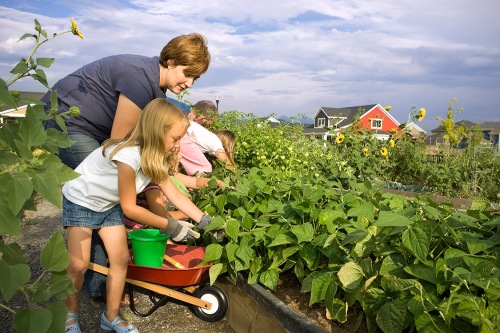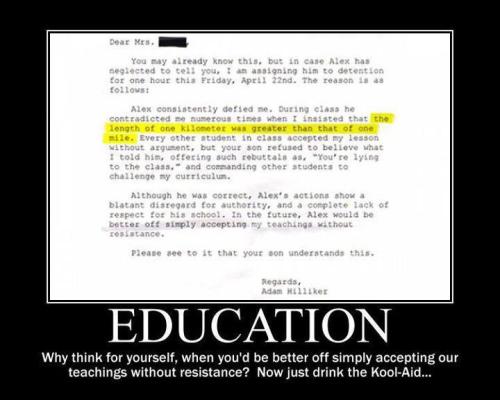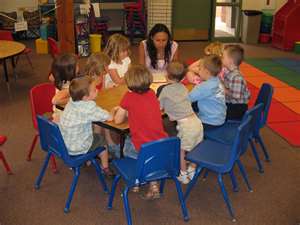Part I of this series was begun so long ago, and yet I still receive requests to continue! I must admit, part of the reason I haven’t moved on in this series is because I’ve been stumped about how to handle the following section. I feel inadequate to the task to flesh out what Dear Charlotte gifts us to use for our little ones’ education. But I will do my best and I ask that you discuss freely in the comments!
To continue our discussion of dear Charlotte’s 20 Principles, we’ll look at what we CAN do to teach our children. I don’t know about you, but after reading all the ‘thou shalt nots’ of number 4, I wondered what was possibly left! Thankfully, Charlotte gives us some really excellent thoughts about how to best teach our littles.
5. The only means a teacher may use to educate children are the child’s natural environment, the training of good habits and exposure to living ideas and concepts. This is what CM’s motto “Education is an atmosphere, a discipline, a life” means.
So here are the three weapons in the Charlotte Mason educational arsenal; environment, habits, ideas. Three simple, powerful ways parents can influence their children toward education. A more detailed of each follows.
6. “Education is an atmosphere” doesn’t mean that we should create an artificial environment for children, but that we use the opportunities in the environment he already lives in to educate him. Children learn from real things in the real world.
In my mind, this point of educational philosophy is placed squarely in the parents’ laps. This isn’t about what a parent can ‘work up’ to create a child-centered atmosphere- imagine preschools where the environment has been carefully engineered to be childish- instead, this point sees that child as an appropriate part of the existing environment. And the existing environment of the home is the exact right place for education to take place.
What are our homes like? What would an ideal environment look like? I believe that Charlotte is advocating for an environment that is rich in things an educated *person* (not simply child) should have a relationship with. In my mind’s eye, I’m envisioning a garden filled with flowers, vegetables and herbs to be tended, handled, prepared and consumed- so the child is not only learning *about* the plants, but is also learning about the *life* of the plants. I see a library that is full of living books that speak with the voice of the author- here the child meets them one by one and spends many an hour ‘discussing’ their stories and views of the world. Here, too, the child brings the authors together to compare and contrast their ideas and then, to add his or her own. I see a telescope, an abacus, walls filled with maps, pets to tend, instruments to play, and friends to pray with and to enjoy.
The environment in which we rear our child should be nourishing- emotionally, spiritually, educationally. We should fill our lives with the things and experiences that draw us to a deeper place in our community, ourselves, our God.
M.F. Jerrold once wrote in the Parents National Education Union newsletter, “…there is nothing in the way of direct teaching that will ever have so wide and lasting effect as the atmosphere of the home… the atmosphere emanates from ourselves- literally is ourselves; our children live in it and breathe it and what we are is thus incorporated into them.”
There was never a scarier or more wonderful thing written concerning how we may educate our children. Being the living, breathing example we wish our kids to follow is one powerful way to educate them. Allowing them to see us being self-disciplined, kind, interested in the world, curious, loving, humble, happy, thankful, careful- just letting them see good things in us- is one third of a Charlotte Mason style education.
But that means that the opposite is also true- our laziness, stinginess, apathy, pride, callousness, anger, discontent, carelessness- all these things may ALSO be a part of what our children are breathing in (gulp!).
Let’s start with an honest appraisal of our children’s environment, our educational atmosphere. Then, let’s continue with prayer and seek the Lord to help us in the areas we are weak. Let’s not get stuck in guilt and shame over the things we struggle with- let’s instead allow our children to see us admitting our sin & the places we fail. This is a good lesson for our children to learn.
7. “Education is a discipline” means that we train a child to have good habits and self-control.
Here is Charlotte’s expression for the need for order. One of my favorite new ideas is ordo amoris (discovered via one of my favorite blogs of the same name) which was described by C.S. Lewis (in the Abolition of Man) thusly:
“St Augustine defines virtue as ordo amoris, the ordinate condition of the affections in which every object is accorded that kind of degree of love which is appropriate to it.Aristotle says that the aim of education is to make the pupil like and dislike what he ought. When the age for reflective thought comes, the pupil who has been thus trained in ‘ordinate affections’ or ‘just sentiments’ will easily find the first principles in Ethics; but to the corrupt man they will never be visible at all and he can make no progress in that science. Plato before him had said the same. The little human animal will not at first have the right responses. It must be trained to feel pleasure, liking, disgust, and hatred at those things which really are pleasant, likeable, disgusting and hateful.”
I believe that likening education to a discipline means setting all things in their proper order- facts, experiences, and relationships. Our first discipline is a right relationship with God- our relationship with *everything* else is determined by this primary discipline being in the right place. When this first discipline is in place, we can rightly discern everything else- astronomy flows *from* God and points back to Him; Algebra comes *from* God and reflects back to Him; Poetry comes *from* God and reflects back to Him.
So, as parents, we acknowledge the need for good discipline- good order- in our lives. And we assist our children to create good discipline/habits from childhood to assist them as they discover ordo amoris in their own lives. So we help them practice simple disciplines- obedience to parents, making the bed each morning, completing a task well and thoroughly.
But, to me, this isn’t only about what we love most, it’s about the process of discerning what is most worthy of our love. So our children walk the pathways with various authors, listening to their ideas, studying the impact of those ideas on history and then comparing both to what they know is right. For our children who have discovered God’s primary place in his/her world, they will be comparing the ideas to scripture. For our children who have not discovered God’s primary place, they will be comparing the ideas to the vein of man’s morality. Either way, they are gaining the discipline of weighing the *worth* of an idea- as adults do.
8. “Education is a life” means that education should apply to body, soul and spirit. The mind needs ideas of all kinds, so the child’s curriculum should be varied and generous with many subjects included.
Education is not only what is learned in books. Education is discipleship. Education is child rearing. So, then, education is the sum of the life we give to our children. It’s the books we read, the math problems we solve, the garden we tend, the courses we run, the instruments we play, the cultural events we attend, the church we serve in- EACH of these together are the sum of education. Just as a child needs a well-rounded diet for proper physical health, a child needs a well-rounded set of experiences and exposures for educational health. So a child needs books and art and exercise and a chance to work. All the many things that we call ‘life’ are, indeed, education and come together to inform the child about the world we all live in and his place in it.
We see the value of our child ‘tasting’ many different dishes so s/he may discover what kinds of food are most to his/her liking. So we spend time exploring as many kinds of ideas & experiences as we can knowing that our child will begin making the connections that are appropriate to him. This *life* is not about memorizing rote facts for the sake of knowing rote facts, but is about discovering one’s individual gifts and talents. As our children discover aptitudes and affinities, s/he is also discovering callings to service and his/her own path to wholeness. And isn’t that the real goal of education? To adequately prepare a child to pursue passions, to live independently and to serve well?
Well, my friends, I certainly hope the post has been worth the wait! And I hope to continue the series sooner rather than later. I look forward to hearing your thoughts on these points!









